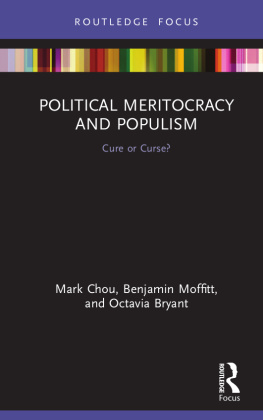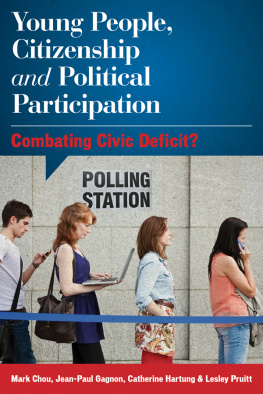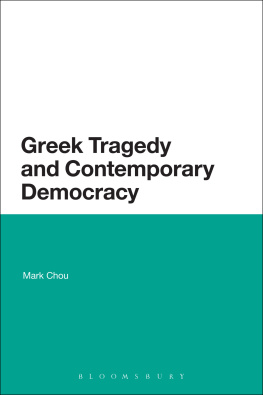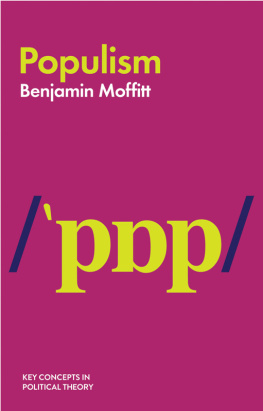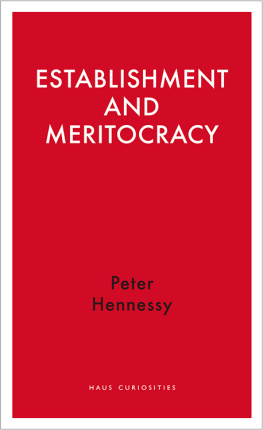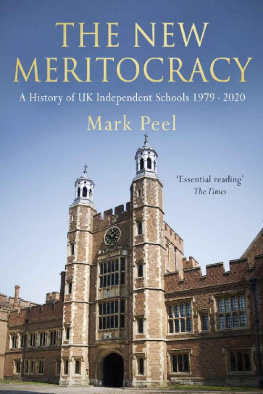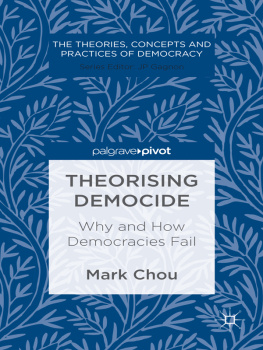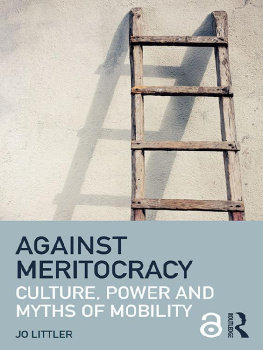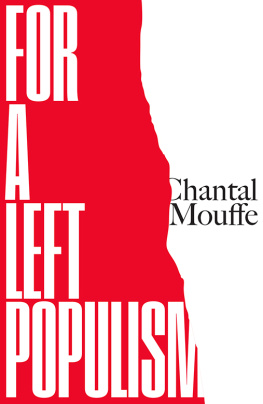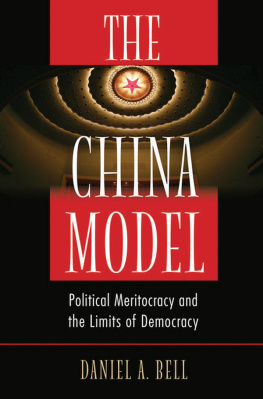Political Meritocracy and Populism
Offering the first in-depth analysis of the relationship between populism and political meritocracy, this book asks why states with meritocratic systems such as Singapore and China have not faced the populist challenge to the extent that liberal-democratic states have. Is political meritocracy immune to populism? Or does it fan its flames?
Exploring this puzzle, the authors argue that political meritocracies are simultaneously immune and susceptible to populism. The book maintains that political meritocracys focus on the intellect, social skills, and most importantly virtue of political leaders can reduce the likelihood of populist actors rising to power; that meritocracys promise of upward mobility for the masses can work against elitism; and that rule by the meritorious can help avoid crises, diminishing the political opening for populism. However, it also shows that meritocracy does little to eliminate grievances around political, cultural, and social inequality, instead entrenching a hierarchy an allegedly just one. The book ultimately argues that the more established the system of political meritocracy becomes, the more it opens the door to populist resentment and revolt.
Pitched primarily to scholars and postgraduate students in political theory, comparative politics, Asian studies, and political sociology, this book fills an important scholarly gap.
Mark Chou is Associate Professor of Politics at the National School of Arts, Australian Catholic University, Melbourne, Australia.
Benjamin Moffitt is Senior Lecturer in Politics at the National School of Arts, Australian Catholic University, Melbourne, Australia.
Octavia Bryant is a Doctoral Candidate in Politics at the National School of Arts, Australian Catholic University, Melbourne, Australia.
Routledge Studies in Anti-Politics and Democratic Crisis
Series Editors: Jack Corbett
University of Southampton
and
Matt Wood
University of Sheffield
This book series aims to provide a forum for the discussion of topics and themes related to anti-politics, depoliticisation, and political crisis. We supposedly live in an anti-political age in which popular disaffection threatens to undermine the very foundations of democratic rule. From the rise of radical right wing populism through to public cynicism towards politicians, institutions and processes of government are being buffeted by unprecedented change that have in turn raised questions about the viability of seemingly foundational practices. The series is intentionally pluralistic in its geographic, methodological and disciplinary scope and seeks works that push forward debate and challenge taken-for-granted orthodoxies.
Refiguring Democracy
The Spanish Political Laboratory
Ramn A. Feenstra, Simon Tormey, Andreu Casero-Ripolls and John Keane
Re-thinking Contemporary Political Behaviour
The Difference that Agency Makes
Sadiya Akram
Political Meritocracy and Populism
Cure or Curse?
Mark Chou, Benjamin Moffitt, and Octavia Bryant
For a full list of available titles please visit
www.routledge.com/series/RSAPDC
Political Meritocracy and Populism
Cure or Curse?
Mark Chou, Benjamin Moffitt, and Octavia Bryant
First published 2020
by Routledge
2 Park Square, Milton Park, Abingdon, Oxon OX14 4RN
and by Routledge
52 Vanderbilt Avenue, New York, NY 10017
Routledge is an imprint of the Taylor & Francis Group, an informa business
2020 Mark Chou, Benjamin Moffitt, and Octavia Bryant
The right of Mark Chou, Benjamin Moffitt, and Octavia Bryant to be identified as authors of this work has been asserted by them in accordance with sections 77 and 78 of the Copyright, Designs and Patents Act 1988.
All rights reserved. No part of this book may be reprinted or reproduced or utilized in any form or by any electronic, mechanical, or other means, now known or hereafter invented, including photocopying and recording, or in any information storage or retrieval system, without permission in writing from the publishers.
Trademark notice: Product or corporate names may be trademarks or registered trademarks, and are used only for identification and explanation without intent to infringe.
British Library Cataloguing-in-Publication Data
A catalogue record for this book is available from the British Library
Library of Congress Cataloging-in-Publication Data
Names: Chou, Mark (Political scientist), author. | Moffitt, Benjamin, 1985- author. | Bryant, Octavia, author.
Title: Political meritocracy and populism : cure or curse? / Mark Chou, Benjamin Moffitt, and Octavia Bryant.
Description: Abingdon, Oxon ; New York, NY : Routledge, 2020. | Includes bibliographical references and index.
Identifiers: LCCN 2019037633 (print) | LCCN 2019037634 (ebook) | ISBN 9780367271022 (hardback) | ISBN 9780429294846 (ebook)
Subjects: LCSH: Political culture. | Political cultureSingapore. | Political cultureChina. | Populism. | PopulismSingapore. | PopulismChina.
Classification: LCC JA75.7 ,C476 2020 (print) | LCC JA75.7 (ebook) | DDC 306.2dc23
LC record available at https://lccn.loc.gov/2019037633
LC ebook record available at https://lccn.loc.gov/2019037634a
ISBN: 978-0-367-27102-2 (hbk)
ISBN: 978-0-429-29484-6 (ebk)
Typeset in Times New Roman
by Wearset Ltd, Boldon, Tyne and Wear
Contents
We wish to thank the series editors, Jack Corbett and Matt Wood for their interest in and support of this book from the outset. We also wish to thank the three anonymous reviewers whose comments on the project in its early stages helped us immensely. Thanks must also go to Claire Maloney at Routledge, and Claire Toal and Allie Hargreaves at Wearset for ably shepherding the book through the production and editing stages.
We thank our colleagues at the National School of Arts (Victoria) at the Australian Catholic University for their warm support and collegiality. Ben would also like to thank colleagues in the Political Theory seminar at his former institutional home, Uppsala University, Sweden, where an early version of this argument was presented, for their helpful feedback. Mark thanks Daniel Bell whose intellectual generosity and encouragement has helped to develop this work.
This research was partially supported by the Australian Government through the Australian Research Councils Discovery Early Career Researcher Award funding scheme (project DE190101127).
Finally, writing a book is always a collaborative process, with many people behind the scenes supporting and guiding the process. Mark would like to thank Rachel for coming into his life, and for her love. Ben would like to thank Ash and Will for their love, patience and support. Octavia would like to thank her partner, Jan van den Driesen for his encouragement and endless support, as well as her mum, Jan Bryant, whose intellectual guidance has been indispensable as she grows as a writer.
Long-established democracies across Europe and North America are currently in the throes of a turbulent and seemingly unyielding populist revolt that has so far managed, with a surprising level of success, to drive a perceived political wedge between democracy and liberalism. From the Brexit vote and Donald Trumps election to the rising popularity of parties such as Italys Five Star Movement, Frances National Rally, Germanys Alternative for Germany, Spains Podemos and the UKs Brexit Party, two things are clear. First, the rise of populism is not limited to one country or one hemisphere (Moffitt 2016). Second, liberal democracy in particular has proven to be an easy target for populist revolt (Pappas 2019; Galston 2018a). Though democracies in their various iterations have never been particularly good at spotting and stopping internal challengers (Keane 2009; Chou 2014), contemporary populists have demonstrated with undeniable clarity and efficacy how it is possible to exploit democratic procedures in order to disrupt deep-rooted liberal norms and patterns of party competition that, they argue, hinder the people from realizing their own democratic interests (Norris and Inglehart 2019; Galston 2018b). More so, in a time of political disruption and a growing sense of discontent and crisis, populists have proven to be highly effective at exposing the deficiencies and problems of liberal-democratic systems, whether exposing the democratic deficit at the heart of elite projects like the European Union, the lack of actual choice offered to citizens in highly-curtailed party systems (Mair 2013), or the corruption, collusion, or falsities that are sometimes proffered in the name of liberal democracy.


